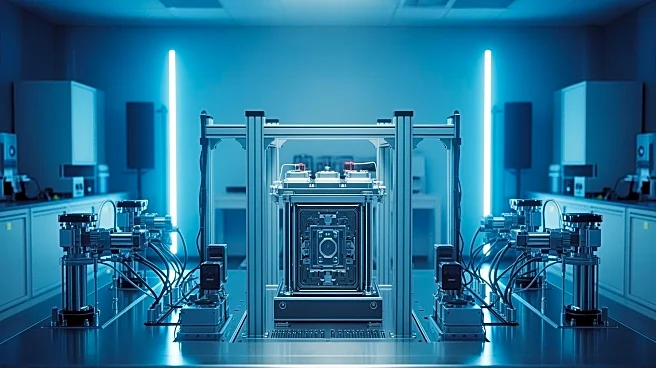What's Happening?
The National Renewable Energy Laboratory (NREL) is spearheading efforts to improve battery safety, focusing on next-generation energy storage technologies. Researchers at NREL are utilizing advanced machine
learning and multiscale modeling to evaluate the safety of new battery designs, including alkali metal anodes and solid electrolytes. This initiative aims to address the growing demand for safer and more efficient energy storage solutions, which are critical for powering consumer electronics and national security systems. NREL's approach involves a comprehensive evaluation of battery cells and materials, assessing their responses to various abuse conditions throughout their lifecycle. Insights from this research are expected to refine cell designs, establish safe operating systems, and standardize practices for first responders dealing with battery hazards.
Why It's Important?
Battery safety is crucial for the reliable deployment of energy storage systems across various sectors, including consumer electronics and national security. As the demand for energy storage solutions continues to rise, ensuring the safety of these systems becomes increasingly important. NREL's research not only aims to enhance the safety of current lithium-ion batteries but also seeks to understand the risks associated with next-generation technologies. By improving battery safety, NREL contributes to strengthening America's energy infrastructure, potentially leading to more resilient and efficient energy systems. This research could also pave the way for the adoption of new battery technologies, offering benefits such as increased energy availability and reduced environmental impact.
What's Next?
NREL plans to continue its rigorous evaluation of battery designs, employing a holistic approach to characterize cells and materials. The laboratory is also exploring the use of artificial intelligence to predict battery behavior under different conditions, which could accelerate the development and deployment of safer battery systems. As NREL advances its research, collaboration with industry innovators will be crucial to bringing new technologies to market. The insights gained from this research are expected to guide the development of safer, more resilient, and lighter battery systems, addressing challenges such as rapid gas release and toxic byproducts.
Beyond the Headlines
The implications of NREL's battery safety research extend beyond immediate technological advancements. By focusing on safety, NREL is addressing ethical concerns related to the deployment of energy storage systems, ensuring that new technologies do not pose undue risks to users or the environment. Additionally, the research could influence regulatory standards for battery safety, shaping policies that govern the use and disposal of energy storage systems. As the industry moves towards more sustainable energy solutions, NREL's work could play a pivotal role in guiding the transition to safer and more efficient technologies.









